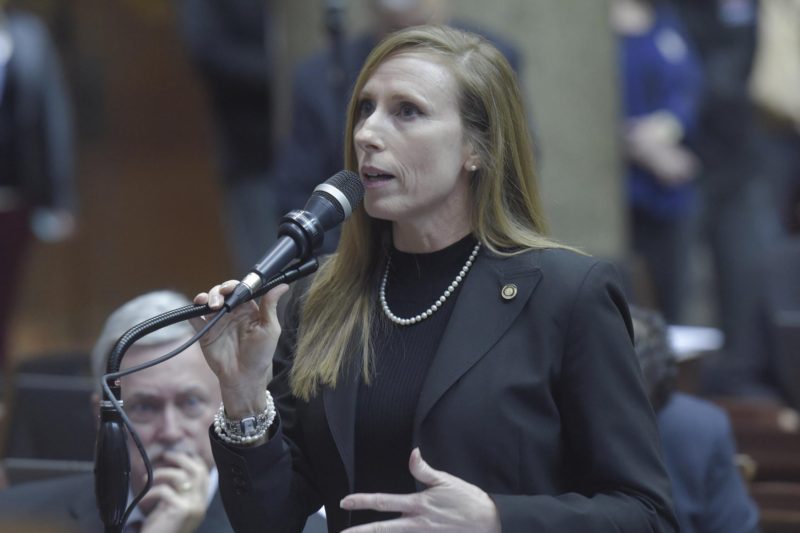JEFFERSON CITY, Mo. – The House perfected Rep. Holly Rehder’s bill to establish a prescription drug monitoring plan (PDMP) after roughly three hours of deliberation and debate. A vote to pass the bill will likely come during Thursday’s session.
The bill, which would create a program to track individuals’ purchases of prescription opiates, has faced multiple hurdles and always come up short in the Senate as Sen. Rob Schaaf has consistently filibustered. While Schaaf argues the bill puts the sensitive medical privacy of Missourians at risk, Rehder says the bill is necessary to give physicians and pharmacists tools to identify doctor shoppers who could be abusing Missouri’s lack of oversight on selling prescription opiates. Doctor shoppers solicit multiple doctors for those drugs to either feed an addiction or to sell.
“We need to help healthcare professionals identify patients who may be at risk for drug misuse and addiction and benefit from intervention,” Rehder said during her remarks introducing the bill.
Missouri remains the only state in the nation to not pass such a law, though several municipalities and counties have decided to pass their own local PDMPs. St. Louis County’s PDMP will go into effect April 1.
Rehder, R-Sikeston, has led the charge on the effort during her five years in the House, and she worked Wednesday to ensure it stayed almost as clean as possible.
After Rehder welcomed an amendment to her bill from Rep. Lynn Morris, R-Nixa, which would require all dispensers to report data regarding opiate dispensation and sales in real time, she shot down three amendments from representatives unfavorable to the legislation.

Rep. Jay Barnes offered an amendment that would create a list for addicts or former addicts to sign onto in addition to the PDMP provisions. He acknowledged he would not likely vote for the underlying bill but insisted he was not trying to add a poison pill to the legislation. He simply wanted to add a voluntary method of oversight for potential abusers who might need the most immediate attention from physicians.
“If we want to be serious about this problem, we have to go beyond the underlying bill and this is one of those solutions,” Barnes said. “This is something more that will help addicts. This will help people in the state of Missouri.”
Nonetheless, Rehder opposed the amendment, saying it should be a standalone bill and not added onto a bill that has received an intense amount of scrutiny in the last five years. It failed on a relatively narrow roll call vote 86-68.
“The underlying bill has been vetted by those over and over by those in the trenches,” she said. “To do anything that could throw another wrench in this process is inappropriate.”
Two other amendments from Rep. Rick Brattin, which would have removed significant portions of the bill and give doctors instructions when providing opiates, and Rep. Jason Chipman, which would have restricted state funds from being used on the PDMP, were viewed as more obstructive to the PDMP actually achieving its goals. They also failed to be added to the bill.
Rep. Justin Hill, R-St. Charles noted during the debate he believed a PDMP was not necessarily the solution, and instead more should be done to stop the overprescription of such drugs. He even noted it was probably one of the few things he would agree with U.S. Sen. Claire McCaskill on since she announced a probe into opioid manufacturers this week.
While the House looks set to pass Rehder’s bill again, the Senate has already sent over a more limited proposal from Schaaf. Schaaf’s bill uses a software algorithm to flag potential doctor shoppers, instead of relying on the human element of doctors or pharmacists to see the prescription records of anyone the suspect is doctor shopping. Republican leadership in the House, as well as Democrats, prefer Rehder’s version, but it’s becoming unclear if Senate leadership feels the same way.
Sen. Dave Schatz has a bill highly similar to Rehder’s but it has been on the Senate Informal Calendar for Perfection since the beginning of March. Schaaf is expected to filibuster.



















